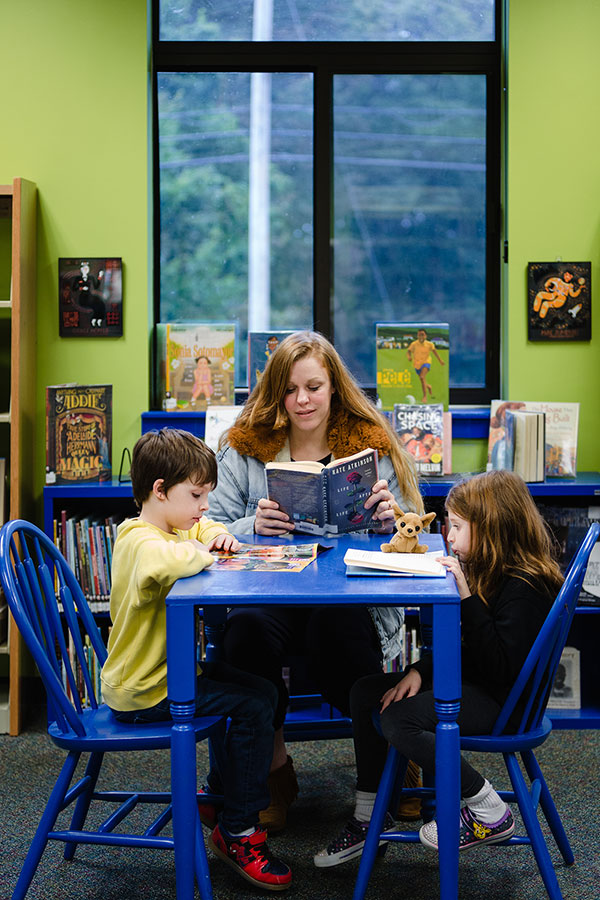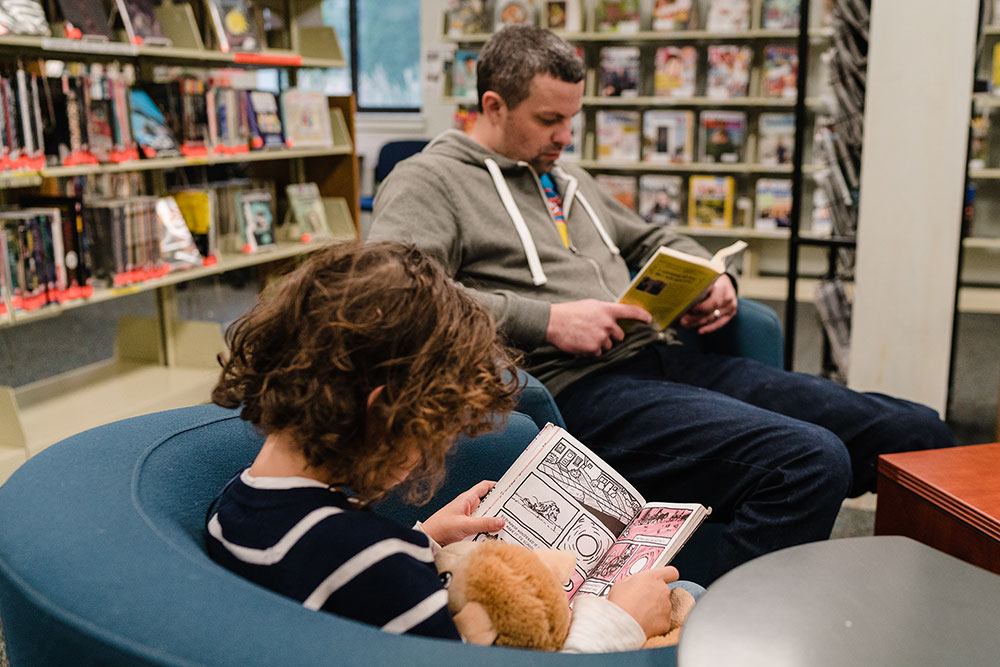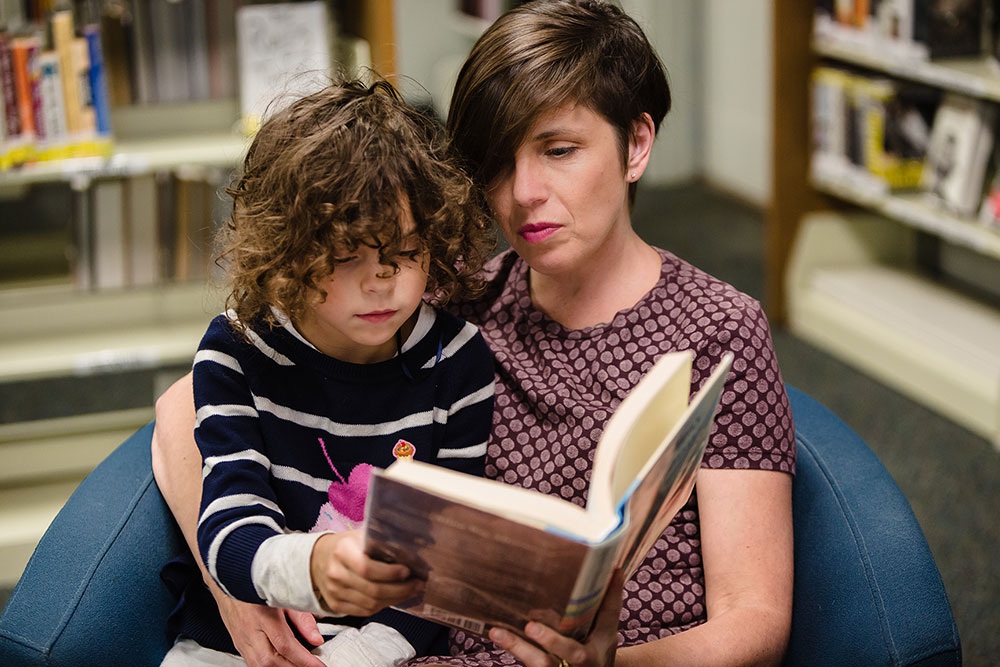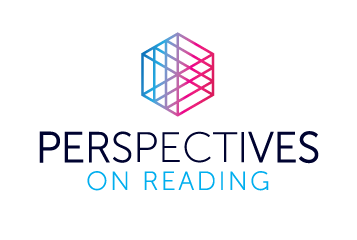The secret to influencing kids’ reading habits while thinking only about yourself

By Sara Lesley Arnold, Librarian | November 2018
“Hey, guys, I’m going to look for a book for me – I’ll meet you back over here?” Jessica, 36, turns toward adult fiction. She and her kids, Jane and Kellan, are regular visitors to their small town public library in Stratham, New Hampshire, where Jessica makes sure to include them in many types of enrichment activities. They do kids’ cooking sessions, play games, do science workshops and come to storytime – all immensely important for them as young learners.
This utterance, however, “I’m going to look for a book for me,” is the action that’s sure to make the children’s librarian smile. But shouldn’t the librarian be more concerned with Kellan making it to storytime? Or with finding him a “just right” book dictated by his dangerously specific reading level? She isn’t. She wants mom to be reading for pleasure.
Why? No matter what academic activities children take part in at school and at the library, motivation to read comes from the way children perceive reading as a family value.
 Joon Kim, pictured above enjoying some quiet time at the library with his son, Maddox, reads mostly while traveling for work. Danielle MacInnes Photography
Joon Kim, pictured above enjoying some quiet time at the library with his son, Maddox, reads mostly while traveling for work. Danielle MacInnes PhotographyPlus, that intrinsic motivation to read, or reading for the sake of reading as an enjoyable act, ultimately leads young children to future successes in middle and high school. Parents who read increase the odds that their kids will be motivated to read by sending the message that reading is of value to their families.
Social scientists have found that this is true with kids of all ages, and librarians agree.
“Children who were interested in reading as preschoolers were more successful readers in the intermediate grades and beyond,” says a group of researchers at the University of Maryland. “Because we know that older children who have more positive motivations toward reading have higher levels of reading achievement, we need to do all we can to ensure that children’s early home lives afford opportunities to develop such motivations.”
They even went so far to say that children’s early literacy interest or motivation may be a more powerful predictor of literacy development than shared storybook reading. (1)
Mothers take note!
Your example matters the most. A 2011 study on family time use in Italy found that in the long run, “there is an intergenerational positive association in the reading habit, and in particular the transmission effect from mother to child persists” even after other family factors are taken into account, such as income and education level. The researchers found that “children have a much higher probability of reading if at least one of the parents reads in their presence… The association seems stronger for mothers than for fathers.” (2)
 Rebecca Seskind regularly models reading for her children, Colette and Louis. Danielle MacInnes Photography
Rebecca Seskind regularly models reading for her children, Colette and Louis. Danielle MacInnes PhotographyRebecca Seskind, mother of three – a toddler, first grader and second grader – sees the causation regularly with her kids, noting that even the baby imitates her, picking up books more frequently all the time. Melanie, mother of a second and fifth grader, has a more structured approach where she sets aside reading time as a family when she reads for herself as well, which ensures that she makes time to read for pleasure as well as the kids.
Lauren O’Neil, mother to two young boys, says that she makes sure to read in front of her kids, letting them know that it’s a special time she sets aside for herself. When faced with an inevitable interruption from her kids, she puts up a finger for them to wait and says, “I’m reading right now. I’ll come help you in a little bit.” This is a great strategy to show her children the value she places on reading as a personal priority. Even though she isn’t sure if the “monkey see monkey do” effect is working yet, her son, Trevor, says enthusiastically that he likes to read when his mom does. With mom’s modeling, he may be an eager reader in the long run.
Fathers, you’re not off the hook quite yet! Studies show that in the short run, kids are copying you too. Even though dads reading for themselves isn’t shown to be the key to long-term reading habits, your kids will copy your behavior right away. In this case, the “imitation of the mother and of the father are found very similar to each other, increasing the probability that their child reads from about 15% to about 30%.” (2) That’s right – you can double the chance that your child will pick up a book just by reading something that interests you.
Lucia Von Letkemann, a teen librarian at the library frequented by Jessica and her kids in Stratham, New Hampshire, is well known for her efforts in identifying adults’ and children’s interests to match them with the right book. She finds that the biggest motivators for kids to read are “freedom of choice, variety of choice and modeling by people in their lives,” including friends and parents. She sees these factors as key to increasing motivation and avoiding the idea that reading is a chore. In fact, research agrees completely, reiterating that teachers and librarians need to encourage parents to model and support the love of reading at home rather than teaching reading skills.
The University of Maryland researchers say that “Parents who believe that reading is a source of entertainment have children with more positive views about reading than do parents who emphasize the skills aspect of reading development…Formal instruction from parents may be counterproductive if it makes learning to read seem like work rather than play.” (1)
 Cleo’s love of reading has rubbed off on her dad, Ian Warner. Danielle MacInnes Photography
Cleo’s love of reading has rubbed off on her dad, Ian Warner. Danielle MacInnes PhotographyWhen reading seems like the go-to activity in which family members choose to partake, the message is clear to children that this is an acceptable pastime for entertainment. According to the authors of the Italian family time use study, “the role model played by parents is a channel through which parental time use may affect children’s behavior and time allocation decisions, and thereafter future children outcomes.” (2)
Parents tend to demonstrate this modeling behavior every day. Since humans as social creatures get so much of what we know in this manner, we see young parents discussing the importance of modeling manners and healthy eating choices across the blogosphere and on parenting sites. We make a point to show our children our own healthy behavior by eating our vegetables and not smoking. We show them how to treat each other respectfully and put diligence into our work to show them how to influence positive outcomes. It now behooves parents, librarians and teachers to become more in tune with adult reading habits and self-care so they can be more aware of how they are representing their time use to their kids.
Psychologist Mike Brooks says, “We cannot be asking from our kids what we are not delivering ourselves, in terms of limiting technology use (and other activities)…Engagement can be with our kids’ activities but also showing that we can sit down and read a book for leisure – we don’t have to be on the screen. That’s great modeling for kids to see!” (3)
Obstacles
Just like many parents, Imani, mom to a high schooler, struggles with the dichotomy of limiting her daughter’s screen time while loving to read ebooks and listen to audiobooks on her phone.
“When my daughter comes in the room, it definitely looks as if I could be flipping through a moment on Twitter,” she said. “I try to take the opportunity to tell her I’m reading – like, ‘Sorry, honey, what was that? I was caught up in my book.’”
These conscious, purposeful interactions around reading are a habit in themselves, but the reward makes it easy to maintain. They certainly come in handy when most of a parent’s reading is done out of sight. In fact, it’s a huge challenge for a lot of parents to make time to read in the presence of their kids, leading to a lot of parents simply reading in bed. Whether parents are reading after the kids are in bed or while traveling for work, it’s vital to communicate this habit to children.
 Librarian Sara Lesley Arnold, who authored this article, enjoys storytime with her daughter, Cleo Warner.
Librarian Sara Lesley Arnold, who authored this article, enjoys storytime with her daughter, Cleo Warner.Danielle MacInnes Photography
Andrew Share, father of two middle school and high school boys, mostly reads in bed.
“But the kids always know what I’m reading,” he said. “I’ll mention it to them, like when my wife asks us all if we want to watch TV. I’ll respond that I’m going to read for a bit. And I sometimes ask the kids if they’ll join me for a reading circle outside where we’ll all read our own thing. Although only my youngest, Avry, ever takes me up on it.”
So often, reading with the kids around is just not feasible. As soon as a mom or dad gets home from work, they have to get supper on the table, supervise homework, pick up after dinner (hopefully with help) and get everyone to bed. Nevermind the time constraints of those parents with infants and toddlers, their attention and energy drained by noon. If these parents are reading for themselves at all, it generally has to be after the kids are in bed. In such circumstances the kids seldom come across their parents with a book in their hands. Especially in these cases, Von Letkemann and other Stratham librarians recommend that parents share with their kids what they like about the book they’re reading, whether around the dinner table or on the car ride home, normalizing reading for entertainment. Not only does this open the door to finding insight into what the kids are liking about the books they’re into, but it also lets kids become more in touch with what they’re looking for in a book.
Of course, like all of us, Lauren O’Neil – the uninterrupted reading-time mom from above – isn’t always on with her reading during waking hours. She says that during times when she finds herself reading mostly in bed out of sight, she makes sure to talk with the kids about the book she’s reading.
“I’ll especially share with them when I’m reading something scary — something they’re really into,” she said.
O’Neil hopes that her enthusiasm for reading will be imitated by both kids. She says that even though she hasn’t seen results that she’s happy with yet, she’s sticking with it and staying conscientious about how her kids perceive her habits.
Since the focus is on motivation to read, children’s and school librarians have the opportunity here to introduce programs that foster parents’ reading habits regardless of their reading ability. Public libraries today must continue their tradition of providing a safe place for adults and children to freely gain access to books, ebooks, audiobooks and magazines of all levels and genres that they truly enjoy.
Now go pick up a book.
References
- Baker, L., Scher, D., & Mackler, K. (1997). Home and Family Influences on Motivations for Reading. Educational Psychologist, 32(2), 69-82. Lawrence Erlbaum Associates, Inc.
- Mancini, A.L., Monfardini, C., Pasqua, S. (2011). On Intergenerational Transmission of Reading Habits in Italy: Is a Good Example the Best Sermon?. Quaderni – Working Paper DSE, no. 792. Alma Mater Studiorum – Universita di Bologna, Dipartimento di Scienze Economiche (DSE), Bologna. Retrieved 9/20/2018 from http://hdl.handle.net/10419/159631
- Brooks, M. (2018). The Foundation for Effective Parenting: How can we be effective parents? It’s the biggest key to influencing our kids. Tech Happy Life. Retrieved 9/20/18 from https://www.psychologytoday.com/us/blog/tech-happy-life/201807/the-foundation-effective-parenting



Great article – thanks Sara! We try to have a “quiet time” on afternoons we are home on weekends and that helps get us all reading.
Good idea, Jennifer! So glad you get to make it a special family moment!